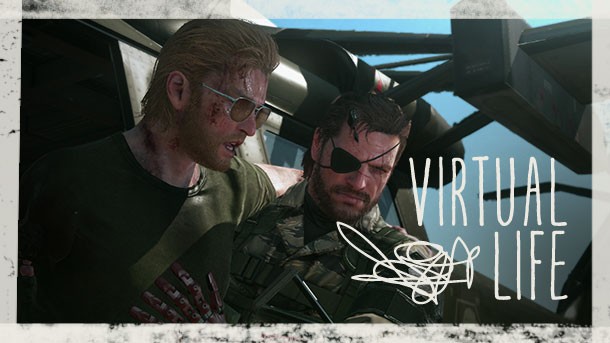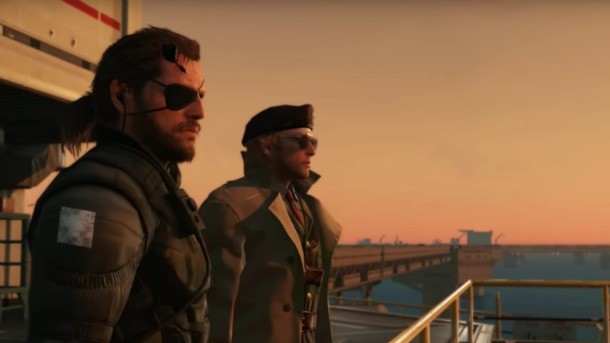The Virtual Life – Trauma And The Futility Of Revenge In Metal Gear Solid V

From the outset, Metal Gear Solid V: The Phantom Pain has been controversial. This entry in the long-running series attracted praise for its mixture of pulp sci-fi, alternate history, and deadly serious subjects, like post-traumatic stress disorder and child soldiers. The Phantom Pain has also been overshadowed by its tumultuous development history, with series director Hideo Kojima eventually departing from Konami on bitter terms, and the game itself ends with a number of major plot points unresolved. For many, myself included, Metal Gear Solid V's last act makes the game feel incomplete.
However, I would argue that even if the incomplete nature of the V's story is incidental and due to developmental issues instead of artistic vision, that lack of closure fits the The Phantom Pain and ends up making it a fascinating meditation on revenge and trauma, and the relationship between the two. Note: I'm assuming anyone reading this is versed in Metal Gear lore and doesn't mind spoilers, just FYI.
The Phantom Pain, both in marketing and its in-game setup, has always been billed as a revenge story. In the events between both games, Venom Snake (who's actually a wounded medic taking Big Boss/Naked Snake's place) and Kazuhira "Kaz" Miller have lost everything. The mercenary group the two formed together, Militaires Sans Frontieres (MSF), has been destroyed by the mysterious group Cipher, headed up by Major Tom, the commander of the original Fox Unit and his Glasgow-smile wearing, backstabbing lackey Skull Face. It's more than just a military outpost that's gone: it's a world that Snake and Kaz carved out for themselves and others in the aftermath of Operations Snake Eater and Peace Walker. Despite still being a military outfit, the MSF was something these two soldiers, traumatized by the events of the previous games, could use as a sanctuary of sorts. In The Phantom Pain Snake, donning a robotic arm to replace the one he lost, and Miller, missing an arm and leg, are out to even the score and take Cipher out of the picture by waging military operations again them and rebuild the MSF as the Diamond Dogs.
On paper this sounds all very generic and it is, to a point. A large portion of the game is spent tracking down Skull Face, who's pursuing his own agenda to sow chaos into the world. During that time, we get a lot of scenes with Kaz, Snake, and Revolver Ocelot waxing about the things they've lost and the wickedness of the world around them. At one point, Kaz breaks down in fury, saying:
Why are we still here? Just to suffer? Every night, I can feel my leg... And my arm... even my fingers... The body I've lost... the comrades I've lost... won't stop hurting... It's like they're all still there. You feel it, too, don't you? I'm gonna make them give back our past!
Of course, as players, we know this is a lie. We've heard these sort of revenge stories and perhaps have lived enough of them to know that revenge does not solve anything. It won't restore to you what you've lost, won't make you whole. In fact, it'll probably make things worse. There are countless stories that parade this maxim. And to that end, The Phantom Pain does not divert. Snake, Miller, and pathetic, squirming scientist Huey (also traumatized, because who isn't?) find Skull Face. They kill him. Brutally:
The scene isn't satisfying in any sense of the word except for its artistic construction. Yes, it's violent. Yes, Skull Face is a bad man who probably deserves to die as much as anyone in the world ever does. And yet, it's excruciating to watch him flop about the ground like a bloodied fish, gasping for breath as he stares at Miller and Snake, begging them to kill him. The killing itself is ritualistic, with Kaz and Snake both wielding the gun that blows apart the dying man's arm and leg. They watch, teeth clenched, hatred lined in their faces. When the dismemberment is done, the pair walk away, leaving him to suffer in his last moments as he bleeds out (only to be killed by Huey). We've seen this sort of scene before. Kill Bill. Oldboy. Lady Vengeance. Memento. I Saw The Devil. And each time the scene ends the same way: Revenge is not satisfying. The trauma remains.
And usually, this is where the story ends, right? Credits roll. We know our characters won't be happy. That they'll still carry their scars for the rest of our lives. And yet, Metal Gear Solid V makes the bold choice of twisting the knife. After the credits, the game goes on.

There's an awkward plot about a virus riding along the back of the English language. Quiet, who has a weird relationship with Venom Snake despite trying to murder him in the opening of the game, disappears. Huey is cast out after it's revealed he murdered his wife. Our would-be heroes continue to run operations around the world, infiltrating outposts, stealing tech, assassinating and kidnapping people, and life continues to go on for The Diamond Dogs. Venom Snake is forced to kill countless Diamond Dog soldiers due to an infection spreading among them that turns them into monsters. Our protagonists' lives become a brutal existence, with none of them finding any semblance of peace. And why should they?
The men leading the Diamond Dogs, including both Real Snake and Venom Snake, have burned the world and murdered countless strangers as well as people they've loved, like The Boss. What sort of peace can exist for people like this? The only transactions they've ever dealt with during the game, and the larger series, have been couched in violence. Even Naked Snake's flirtations and concepts of love in Metal Gear Solid 3 occur in a violent context, like the infamous gun scene between him and EVA, or even more fittingly, the duel that closes the game out:
All the characters of Metal Gear know are violence, which is why they try to respond to the trauma they've received in ways that are largely ineffectual. Kaz and Venom Snake won't find any happiness in retribution. And the structure of the game, by accident or otherwise, reflects that. The unresolved plot details, like Psycho Mantis' getaway with the language virus, and how child Liquid becomes the self-absorbed psychopath we see in Metal Gear Solid, stick out like a robo thumb, and Act 2 is largely composed of harder versions of missions from Act 1. As understandably disappointing as this is, I feel as though this sensation of incompleteness combined with repetition of these sequences ultimately plays well into The Phantom Pain's themes.
Despite having executed their lust for revenge on Skull Face, the Diamond Dogs can't escape the past: both the things they've done or had done to them. And while many stories across all sorts of mediums make that sort of statement over and over again, particularly about revenge or the detrimental effects of warfare on the psyche, Metal Gear Solid V's structure makes it interesting in a way that games can only do. By having us live out the repetition of revising trauma and the anticipation and disappointment tied to not finding closure, The Phantom Pain becomes strong commentary on the nature of living and how damn hard it is to let go of toxic factors of our lives and move on. Because the truth is that many people don't move on from what's happened to them. They embrace their emotional violence and, in Snake's words, become "demons" of a sort. In the end, The Phantom Pain is a harsh story about men and women becoming trapped in a loop of violence, failing to get out of it, seeing only bloody, ineffective solutions for their traumas. For both Snakes, For Kaz, For Quiet, For Huey, there is no ending to their suffering. There is no closure. And as people participating in this experience, why should we receive closure when they don't?
Paradoxically, The Phantom Pain is a fuller, and more satisfying thematic experience than most video games because of how it takes us into the lives of people who do bad things because they're hurting and trapped in vicious cycles and then refuses to let them out of it. While the generation of heroes we see in MGS 1,2, and 4 eventually earn something of an optimistic ending, their forefathers are mired in the tragedy of their actions until they no longer draw breath. In that way, Metal Gear Solid V's abrupt conclusion feels bold, a release for the audience from watching these characters live out the loop over and over again.
It's a mercy.

Get the Game Informer Print Edition!
Explore your favorite games in premium print format, delivered to your door.
- 10 issues per year
- Only $4.80 per issue
- Full digital magazine archive access
- Since 1991









